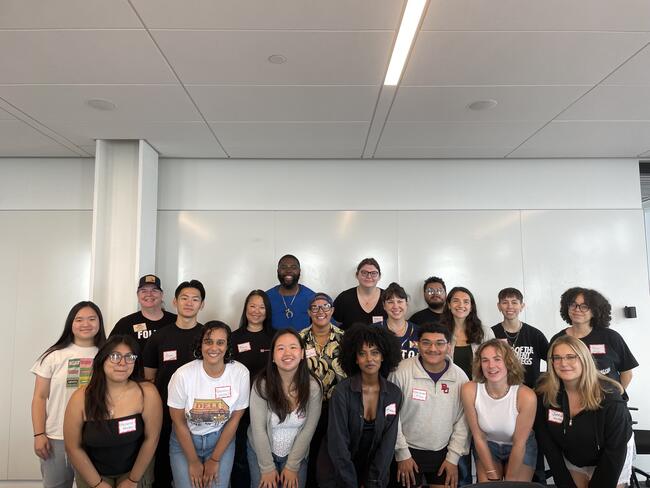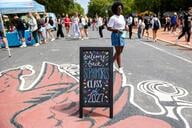You have /5 articles left.
Sign up for a free account or log in.

Students of all degree paths at Boston University can participate in first-generation student programming at the Newbury Center.
Maria Erb/Boston University
First-generation students make up about one-third of college applicants, according to 2024 data from the Common App, but only 24 percent of first-generation college students graduate with a bachelor’s degree, compared to 59 percent of students from continuing-generation families.
At Boston University, administrators recognized that students who are the first in their families to attend college face challenges not just in their undergraduate years, but also as postgraduate and doctoral students. At the Newbury Center, the university’s centralized first-generation student support office, staff and faculty help first-generation students of all degree levels navigate higher education and thrive.
The background: The Newbury Center was established in 2021 using $6 million in endowed funds from now-closed Newbury College to support first-generation and low-income learners at Boston University. BU enrolls 3,400 first-generation undergraduate students, approximately 20 percent of the total population.
The university defines first-generation undergraduate students as a student whose parents, guardians or caregivers have not completed a four-year bachelor’s degree, and for graduate students whose parents have not completed an advanced degree of any kind.
The goal is to build a sense of belonging and community for first-generation students on campus, as well as encourage students to take advantage of a myriad of resources available to them, Executive Director Maria Erb said. One of the benefits of the office’s cross-campus offerings is it can provide continued assistance for first-generation students who choose to stay at BU for their graduate program.
Leading with intention: The center is led by faculty director Anthony Abraham Jack and five full-time staff members who conduct research on the first-generation experience, many of whom were first-generation students themselves. The Newbury Center is housed in the provost’s office, allowing for strategic collaboration with other academic support offices, including career services, the library and student well-being.
Staff provide one-on-one advising for learners, “not trying to replace academic advisers or other people,” Erb clarified, but to serve as a one-stop shop for students to get plugged in.
Newbury Center staff take an asset-based approach to first-generation student support, helping them connect how past experiences navigating challenges or overcoming hurdles have gotten them to where they are, Jack said. “The setting may be new, but having to learn a new skill set in a new place is something they have done before. We try to center the first-gen experience and the first-gen narrative in a way that helps students understand where they are in a much larger chain of events.”
Programming for all degree programs: The Newbury Center offers regular community-building events to connect first-generation students to their peers, including Fuel Up Friday, a weekly bagel breakfast to promote social belonging. At the BU Medical campus, the Newbury Center holds monthly lunchtime gatherings to help connect learners across disciplines.
“We know grad school can be very isolating, especially for Ph.D.s,” Erb said. “A lot of time, for students in grad degrees, they stay within their program, but now the students are like, ‘Oh, I met someone in a totally different degree program that I would have never met if I didn’t come.’”
The office also gives financial support to learners interested in high-impact practices, including study abroad, internships or research that may be cost-prohibitive. One example is on-campus housing stipends for students participating in unpaid or underpaid internships. A new initiative from the university will provide seed grants to professional and graduate students to conduct research, participate in a conference or something similar, recognizing funding cuts have impacted research dollars across higher education.
Career exploration is one area in particular where first-generation students need additional support, Erb said.
“As first-gens, it’s the classic [options of] doctor, lawyer, engineer, teacher, businessperson,” Erb said. “But helping our students understand, there are so many different careers out there that, as first-gens, we may never have been exposed to.”
“There’s a lot of growth that happens while students are in school,” Jack said. “Students’ specialties may change in graduate school,” so staff aim to be responsive to how their career goals may shift.
BU recently switched its student information system, allowing student affairs folks to identify first-generation students at the graduate and undergraduate level to provide more targeted engagement.
What’s next: Looking ahead, Jack hopes to focus on expanded data collection and analysis of the first-generation experience at BU to better serve their needs.
“We need to know who is going to these [support] centers, and if they are going early. Are they going late?” Jack said, recognizing first-generation students may be averse to help-seeking or unaware of when they may need support. “We need to be able to understand what is the flow of traffic by group? Are our first-gen students entering support services at the same rate, frequency and timing as their continuing-generation peers? And if not, how can we intervene?”
Keep Reading
For more resources and advice on how to support first-generation college students, consider these articles:



